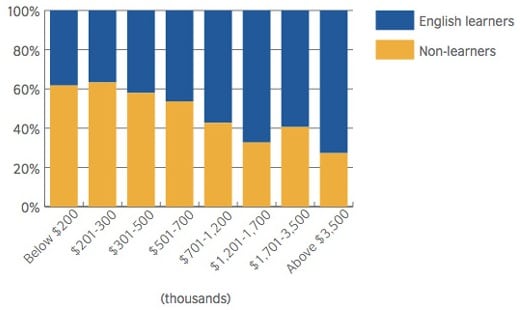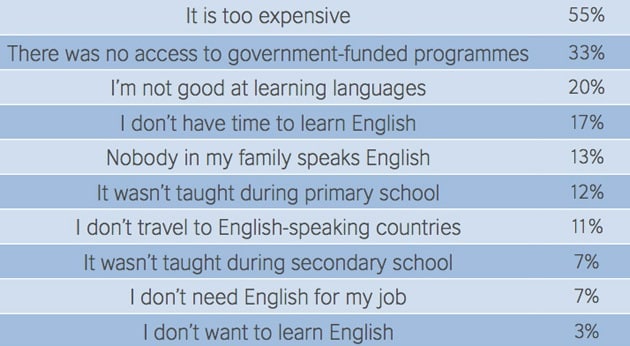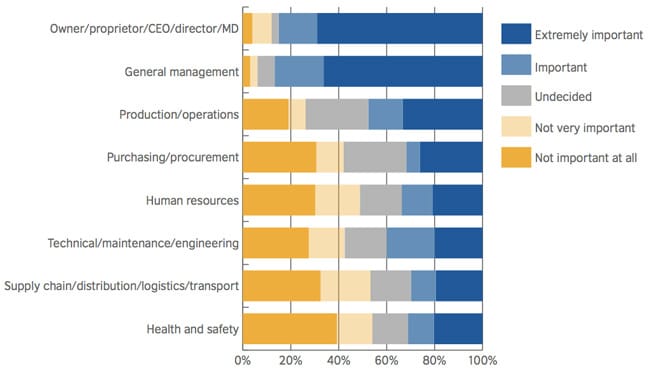Does People In Chile Learn English?
Curt on fourth dimension? Here are the highlights:
- Need for English language training is strong in Chile, and expected to grow
- This is being fuelled both by the increasing globalisation and diversification of the Chilean economy also as government policies that have expanded English Language Teaching throughout the country and besides increased scholarship support for study abroad
- English proficiency is slowly increasing, albeit unevenly, across the country and is strongly correlated to income and occupation
Demand for English Linguistic communication Teaching (ELT) in Chile is strong, largely driven past the need for English-speaking professionals, academics, and technicians to staff its increasingly internationalised industries. Chile has a large economy fuelled by mineral production, particularly copper. Still, the authorities sees economic diversification equally the path to a more prosperous and stable futurity, and education policy equally a key component of achieving this goal. Role of this policy is a move toward a fuller integration with the global economy, and toward bilingualism, with English as the main second language to exist adopted.
In 2003, the Ministry of Education (MINEDUC) launched Programa Inglés Abre Puertas, or the English Opens Doors Programme. This initiative was specifically enacted with economic evolution in mind, and its goal was to give all young people at to the lowest degree some proficiency in English. It was aimed at all students, simply centred on those who were disadvantaged. The government idea this would heave the country's global competitiveness, reduce inequality, and democratise opportunities for immature Chileans.
Nevertheless, by 2010, TOEIC Bridge test results indicated that only 11% of form eleven students had reached A2 or basic level in English. While this was an comeback on the 5% result from 2004, the authorities had hoped A2 level would be reached by course viii students, and that form 12 students would reach B1 or independent level by 2013. In addition, outcomes differ radically between rich and poor communities, mainly due to the fact that individual schoolhouse students begin learning English earlier and benefit from more than education hours.
Data from EF Didactics Starting time charts Republic of chile'south efforts to heighten its proficiency. In 2011 the country ranked 36 of 44 surveyed, with "very low" proficiency. 2012 and 2013 saw increases that pulled Republic of chile's ranking up to 38 of 52, then 44 of 60. But in 2014 Chile landed in 41st place out of 63 ranked nations, and 2015 brought a ranking of 36 out of 70. These results are relative to other countries only Chile's overall proficiency has increased in five years from "very depression" to "low," moving it past nations such as Prc, however on the whole other countries in the survey are also improving.

Chile's progress up the EF English Profiency Index ranking, 2011-2015. Source: EF
The English Opens Doors Programme (EODP), meanwhile, had challenges from the showtime. It was launched during a time when the Chilean education sector was dealing with inequality in admission, inconsistent quality, and a countrywide teacher shortage, especially in rural regions. On height of all that, teacher funding has always been and remains a problem. Nether upkeep guidelines, the government pays teachers for a minimum amount of hours, merely whatsoever accumulation beyond that threshold must be paid for past individual schools.
At the university level, high levels of autonomy left schools outside EODP's influence. The Ministry of Education introduced a set up of guidelines for English language teachers, but the standards were considered past some observers to exist college than those attainable past many schools. A lack of communication concerning teaching methods and curriculum as well created problems.
EODP has been refined since to focus merely on municipal schools in 15 regions. The Ministry of Instruction and local government have worked together to identify areas where the programme can exist most effective, and reoriented those schools to maintain a special focus on English.
For many critics of the EODP, the main concerns circumduct effectually national sovereignty problems related to widespread penetration of English language, the potential extinction of the many ethnic languages in Chile, and the marginalisation of other earth languages, which could in plow nowadays barriers to creating fully rounded and globally engaged citizens. Yet people are keenly aware that employment barriers exist for those with limited or no English skills. According to the British Council, EODP is considered a success by its proponents, despite its shortcomings.
English and the people
Despite the logistical issues EODP has faced, an awareness of the benefits of English in the globalised economic system has spread among the general population. A widely publicised study by the British task recruitment and employment agency Adecco showed that English speakers earned well-nigh 30% more than non-English speakers, and farther survey information compiled by the British Quango gives a clear pic of how English language proficiency correlates to income in Chile.

The link betwixt household income and English proficiency in Chile. Source: British Council
The British Quango asked Chilean speakers of English language when they had learned the language and institute that well-nigh had taken mandatory classes across various educational levels. Just over half (51%) had studied information technology in primary school, 70% at the secondary level, 59% at the undergraduate level, and 1% during postgraduate studies. The survey also showed that 3% learned it as students or teachers overseas, iv% while travelling overseas, v% while participating in a government-funded plan, and 6% through their job.
Only about 20% of respondents said they had studied English language at a individual language school. Chile is home to numerous individual English providers, just generally only upper and heart grade students have the means to enrol at such schools. Online learning provides an alternative, yet data shows that such methods are best suited for older students who possess the field of study for self-study. For younger learners, online linguistic communication learning tin can exist a challenge.
The British Council too looked at the other side of the equation, querying those who hadn't learned English language. The survey allowed respondents to select up to three reasons why they hadn't learned the language. Those results announced in the chart below.

Barriers to learning English for Chilean students. Source: British Quango
When not-learners were asked to choose up to 3 reasons why they would learn English, the vast bulk (82%) said they would exercise it ameliorate their employment prospects. Smaller percentages said they would do it travel abroad (53%), if classes were free (42%), to amend quality of their lives (35%), to consume English media (19%), to emigrate (xviii%), and to amend social condition (16%).
British Council also surveyed Chilean employers and found that while 85% of companies communicated internally using Spanish, 15% used English. Almost of those companies were in the business of educational activity or language training. When asked which languages were used externally, 88% used Spanish, only 38% used English language besides. This group was concentrated in the hospitality, amusement, and restaurant industries, though teaching, accounting, compages, and recruiting likewise made up a meaning portion.
Echoing the relationship between income level and English language proficiency, data also showed that managerial staff at responding companies had significantly higher English proficiency than non-managerial staff. Merely over a third (34%) of respondents reported that more than lxx% of managers were adept in English. More nine in ten managers (94%) agreed that English was an essential skill for managerial staff. The survey also asked how of import English was to specific roles within companies. The results of those responses appear in the nautical chart below.

The importance of English proficiency for selected fields and levels of employment. Source: British Quango
Another important facet of English in Chile highlighted by British Council survey is the role that exposure to the language plays in learning. There are few opportunities in Chile's far-flung rural reaches to practise speaking, reading, and writing English. The state boasts the highest internet penetration in Latin America, which helps span geographical distance in terms of English exposure, just fifty-fifty so just almost 65% of the population is connected. That's at the depression terminate within the OECD, of which Chile is a member. Past contrast internet penetration is at 95% in Sweden, 85% in the US, and 75% in Barbados.
Government policy
Republic of chile's geography has presented special challenges to regime plans to increment English proficiency. Extending 4,300 kilometres north to south, much of the country is remote and mountainous, which presents obstacles to implementing policies evenly nationwide. Send can exist problematic. In smaller schools students are ofttimes taught in classes with no regard for historic period or class, and in some areas school attendance is low. All of these characteristics present problems to administering quality English training.
Despite some bug in Chile'due south ELT sector, demographic and market forces signal toward overall demand for English increasing in coming years. However, Chile is one of the most economically unequal countries in Latin America, which ways the best opportunity for international educators to attract a full spectrum of students lies with scholarship programmes such every bit Pingüinos sin Fronteras(Penguins Without Borders), a plan for secondary school students established in 2013, Semillero Rural, which focuses on vocational and technical training (particularly in the agriculture sector), and BECAS Republic of chile.
Families may have an uptick in bachelor funds for education if President Michelle Bachelet follows through on her promise to ensure free pedagogy for all. She had initially announced a March 2016 timeline for achieving this goal, just at the moment only 14% of students in the poorest households attend academy tuition-free, according to a study past Confech. Just weeks ago 120,000 students marched to demand progress on the free education front, too equally protestation school privatisations and high pupil debt.
The government's programme, however, hitting some other roadblock when Chile'southward Constitutional Court blocked part of the costless academy proposal, necessitating changes to the plan. President Bachelet now promises that lxx% of students will be receiving free college instruction by 2018, and that universal admission volition be achieved in 2020.
Education costs are no pocket-size matter in Chile. For those who notice themselves exterior the free-tuition scheme Republic of chile remains one of the most expensive countries in the world in which to obtain a standard bachelor's degree, when price is measured as a percent of household income. This ways parents often take on crippling debt in lodge to pay for higher education-and is i reason the free-tuition movement has enjoyed up to 81% support for the general public.
Chile's teaching reforms, while not directly focused on English proficiency, volition ultimately change how language teaching is administered. Some of the new policies will place pressure on private schools, which could affect toll at these institutions in a way benign to the general population. The EODP means that English language will exist taught sooner and in more than communities, while nationwide complimentary university tuition, if it comes to pass, volition heave learning opportunities for higher students. All that to say, the expansion of English language Language Teaching and English proficiency in Republic of chile is destined to accelerate.
For additional background on this important Latin American market, please run into our contempo post, "Targeting demand for study away in Chile."
Does People In Chile Learn English?,
Source: https://monitor.icef.com/2016/04/chile-continues-to-push-for-improved-english-proficiency/
Posted by: elliottcrial1955.blogspot.com


0 Response to "Does People In Chile Learn English?"
Post a Comment